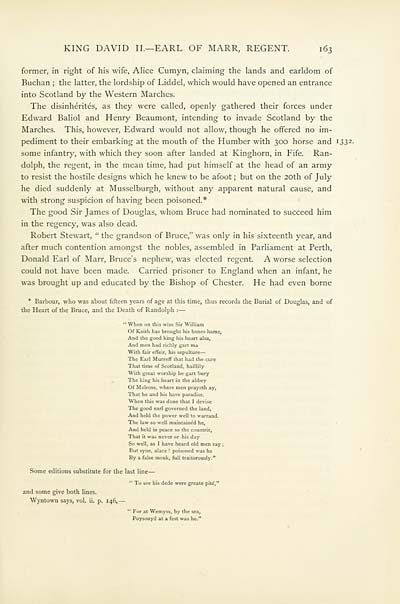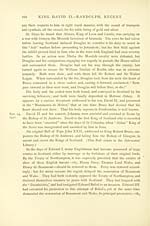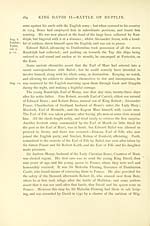Family records of the Bruces and the Cumyns
(175) Page 163
Download files
Complete book:
Individual page:
Thumbnail gallery: Grid view | List view

KING DAVID II.— EARL OF MARR, REGENT. 163
former, in right of his wife, Alice Cumyn, claiming the lands and earldom of
Buchan ; the latter, the lordship of Liddel, which would have opened an entrance
into Scotland by the Western Marches.
The disinherites, as they were called, openly gathered their forces under
Edward Baliol and Henry Beaumont, intending to invade Scotland by the
Marches. This, however, Edward would not allow, though he offered no im-
pediment to their embarking at the mouth of the Humber with 300 horse and 1332
some infantry, with which they soon after landed at Kinghorn, in Fife. Ran-
dolph, the regent, in the mean time, had put himself at the head of an army
to resist the hostile designs which he knew to be afoot ; but on the 20th of July
he died suddenly at Musselburgh, without any apparent natural cause, and
with strong suspicion of having been poisoned.*
The good Sir James of Douglas, whom Bruce had nominated to succeed him
in the regency, was also dead.
Robert Stewart, " the grandson of Bruce," was only in his sixteenth year, and
after much contention amongst the nobles, assembled in Parliament at Perth,
Donald Earl of Marr, Bruce's nephew, was elected regent. A worse selection
could not have been made. Carried prisoner to England when an infant, he
was brought up and educated by the Bishop of Chester. He had even borne
* Barbour, who was about fifteen years of age at this time, thus records the Burial of Douglas, and of
the Heart of the Bruce, and the Death of Randolph : —
" When on this wise Sir William
Of Keith has brought his bones hame,
And the good king his heart alsa,
And men had richly gart ma
With fair effeir, his sepulture —
The Earl Murreff that had the cure
That time of Scotland, haillily
With great worship he gart bury
The king his heart in the abbey
Of Melrose, where men prayeth ay,
That he and his have paradise.
When this was done that I devise
The good earl governed the land,
And held the power well to warrand.
The law so well maintained he,
And held in peace so the countrie,
That it was never or his day
So well, as I have heard old men say ;
Eut syne, alace ! poisoned was he
By a false monk, full ttaitorously."
Some editions substitute for the last line —
" To see his dede were greate pite","
and some give both lines.
Wyntown says, vol. ii. p. 146, —
11 For at Wemyss, by the sea,
Poysonyd at a fest was he."
former, in right of his wife, Alice Cumyn, claiming the lands and earldom of
Buchan ; the latter, the lordship of Liddel, which would have opened an entrance
into Scotland by the Western Marches.
The disinherites, as they were called, openly gathered their forces under
Edward Baliol and Henry Beaumont, intending to invade Scotland by the
Marches. This, however, Edward would not allow, though he offered no im-
pediment to their embarking at the mouth of the Humber with 300 horse and 1332
some infantry, with which they soon after landed at Kinghorn, in Fife. Ran-
dolph, the regent, in the mean time, had put himself at the head of an army
to resist the hostile designs which he knew to be afoot ; but on the 20th of July
he died suddenly at Musselburgh, without any apparent natural cause, and
with strong suspicion of having been poisoned.*
The good Sir James of Douglas, whom Bruce had nominated to succeed him
in the regency, was also dead.
Robert Stewart, " the grandson of Bruce," was only in his sixteenth year, and
after much contention amongst the nobles, assembled in Parliament at Perth,
Donald Earl of Marr, Bruce's nephew, was elected regent. A worse selection
could not have been made. Carried prisoner to England when an infant, he
was brought up and educated by the Bishop of Chester. He had even borne
* Barbour, who was about fifteen years of age at this time, thus records the Burial of Douglas, and of
the Heart of the Bruce, and the Death of Randolph : —
" When on this wise Sir William
Of Keith has brought his bones hame,
And the good king his heart alsa,
And men had richly gart ma
With fair effeir, his sepulture —
The Earl Murreff that had the cure
That time of Scotland, haillily
With great worship he gart bury
The king his heart in the abbey
Of Melrose, where men prayeth ay,
That he and his have paradise.
When this was done that I devise
The good earl governed the land,
And held the power well to warrand.
The law so well maintained he,
And held in peace so the countrie,
That it was never or his day
So well, as I have heard old men say ;
Eut syne, alace ! poisoned was he
By a false monk, full ttaitorously."
Some editions substitute for the last line —
" To see his dede were greate pite","
and some give both lines.
Wyntown says, vol. ii. p. 146, —
11 For at Wemyss, by the sea,
Poysonyd at a fest was he."
Set display mode to:
![]() Universal Viewer |
Universal Viewer | ![]() Mirador |
Large image | Transcription
Mirador |
Large image | Transcription
Images and transcriptions on this page, including medium image downloads, may be used under the Creative Commons Attribution 4.0 International Licence unless otherwise stated. ![]()
| Histories of Scottish families > Family records of the Bruces and the Cumyns > (175) Page 163 |
|---|
| Permanent URL | https://digital.nls.uk/95073086 |
|---|
| Description | A selection of almost 400 printed items relating to the history of Scottish families, mostly dating from the 19th and early 20th centuries. Includes memoirs, genealogies and clan histories, with a few produced by emigrant families. The earliest family history goes back to AD 916. |
|---|

